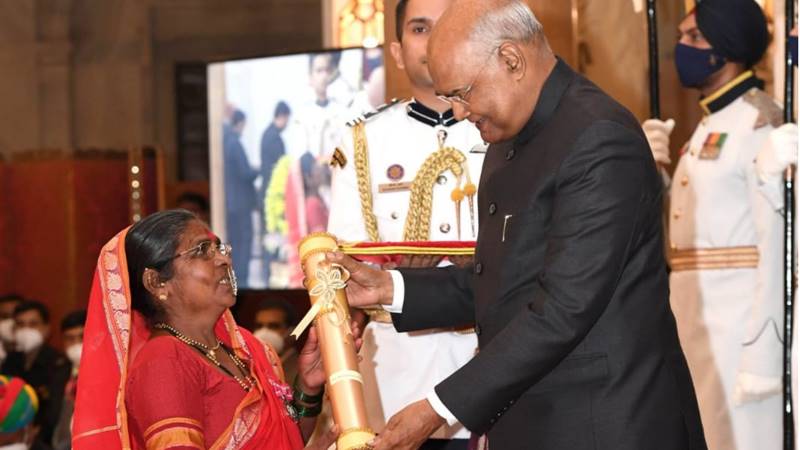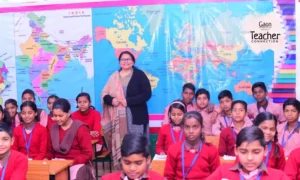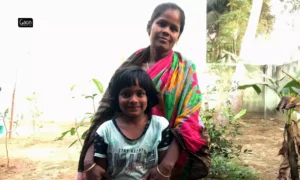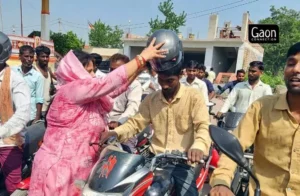Padma Shri Rahibai Popere, who lives in a small tribal village in Maharashtra, received the country’s fourth-highest civilian award for her contribution to agriculture at a ceremony held yesterday, November 8, at New Delhi.
President of India Ram Nath Kovind conferred the award to the 61-year-old tribal farmer, who is also known as the ‘Seed Mother’ and ‘Seed Woman’ of India. A cheerful and humble Popere, who has conserved 154 indigenous varieties of seeds, dedicated her award to all the farmers and the soil of her village Kombhalne in Ahmednagar district.
President Kovind presents Padma Shri to Smt. Rahibai Soma Popere for Agriculture. Popularly known as 'Seed Mother', she is a tribal farmer from Mahadeo Koli, Tribal community from Ahmednagar district of Maharashtra. pic.twitter.com/IKFeaROoVQ
— President of India (@rashtrapatibhvn) November 8, 2021
A day after being conferred Padma Shri award, Popere spoke with Gaon Connection over the phone, in her mother tongue Marathi. “I have received this award but I will always be a small farmer. Every farmer does their bit. Everyone should get justice and as much respect,” said the Seed Mother of India. “This award is for all my farmers and my soil,” she added.
“The soil is like our mother. When a married woman comes from her sasural (husband’s home) to her mayeka (parents’ home), she receives a lot of love from her parents. That is the connection we have with our mother earth (soil). We sow seeds with that emotion,” Popere told Gaon Connection in Marathi.
Also Read: This ‘seed woman’ never went to school, but has valuable lessons for us and the farmers
Yesterday, on 8 November, 119 people were awarded Padma Shri by the Indian President. Prime Minister Narendra Modi also attended the awards ceremony and congratulated those who have been conferred the ‘Peoples Padma’. Popere was one amongst them.
“I conversed with Modi ji for a long period. He knows me by name. He asked me about my routine and promised to visit me in my village,” said a cheerful Popere, whose village is about 125 km from Pune in Maharashtra.
“I have welcomed him. But how will he come? My village is in a remote place and has no roads,” said the Padma Shri awardee.
Popere told Gaon Connection that she had pointed out this issue three years ago as well. “I got a Nari Shakti (women empowerment) award three years back. I told him (PM Modi) about the road issue here. But so far no roads have been built,” she said.
“Yethey road naai hai, paani naai hai (There are no roads and proper water facility here). I am given so many awards but no one is able to solve challenges we face here on a daily basis,” she said.
The road to Padma Shri
Working from her remote village, Popere is taking farming back to its roots. She has pioneered a movement to preserve indigenous seeds and has 154 varieties including rice and jowar (sorghum used to make chapattis), preserved in traditional ways.
“I don’t remember when exactly I started collecting seeds because I don’t know how to count, but I think it must have been 20-22 years back,” she told Gaon Connection in an interview last year in 2020.
“My grandchildren would keep falling sick. There were malnourished children around me, which was never the case earlier. I realised that it was happening because all of us were using too many pesticides and chemical fertilisers,” said the tribal farmer.
“Ours is a small village and most of us are into farming. That’s our only source of income. People wanted to earn more so they were rampantly using chemical fertilisers. We were practically eating poison,” she added.
Popere decided to reverse this and go back to the basics of farming.
The indigenous crops that she talks about, and whose seeds she has been conserving, need only water and air to grow (and not chemical fertilisers), but hybrid crops require more water and pesticides.
“No one taught me this. My father used to say ‘old is gold’, so I started preserving these seeds. You don’t get old varieties of rice and some other grains anymore in the market. But I have them all,” said Popere, who has conserved 154 native varieties of crops.
Initially, the women in her village laughed at her, but Popere persisted. Gradually, people started talking about her. The word about her work started spreading to other villages and then the authorities started taking note of it. Soon, people started inviting the tribal farmer to talk about her work on seed conservation.
Even then her family – her husband, three sons and a daughter – would wonder what Popere was up to. “But they never stopped me. Soon I started winning awards. My house was so small that I didn’t have space to keep the awards or my seed collection. Some politician – I don’t remember his name or who he is – helped me build a bigger house,” said the Padma Shri awardee.
After successfully implementing all that she learnt, Popere now trains farmers and students on seed selection, techniques to improve soil fertility and pest management. She supplies farmers with seedlings of native crops, encouraging them to switch to native varieties.
Popere also tells them about the benefits of traditional farming and irrigation techniques — measures she believes will help crop growers mitigate the impact of climate change, and focus on native species of seeds.
Also Read: Using indigenous seeds to sustain livelihoods, fight climate change and pay off loans
Will anything change after you go back home with the Padma Shri? “Nothing has changed so far. We will go back to our village and do farming,” said Popere, who is currently in the national capital of Delhi and is preparing for her exhibition to showcase the indigenous varieties she has preserved for the past two decades.
However, her concern remains an approach road to her village in Maharashtra.
With inputs from Sushen Jadhav in Aurangabad, Maharashtra.



















